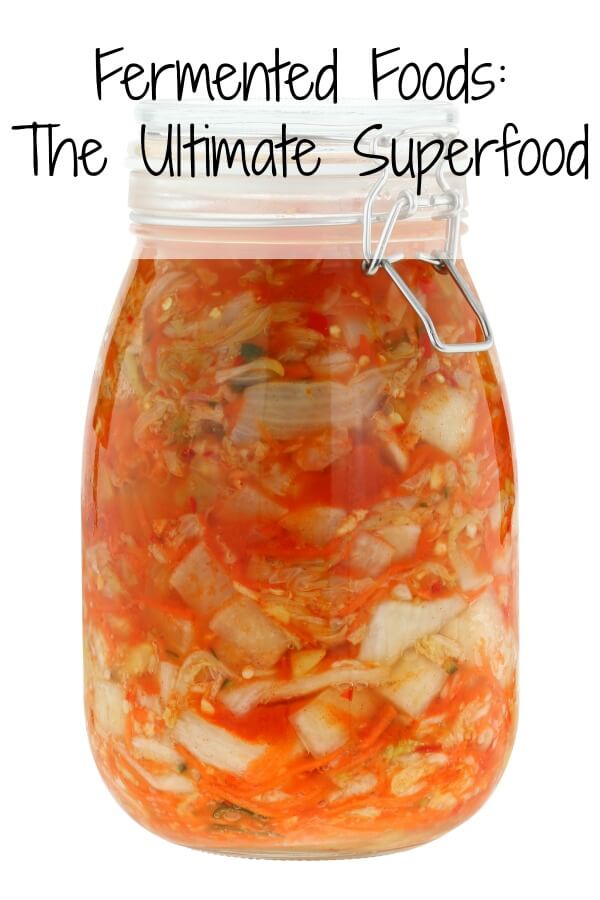This is a guest post from Elaine Ferrer of Mercola.com. I hope you enjoy it as much as I did!
Fermented Foods: The Ultimate Superfood
During the Roman era, people consumed sauerkraut, or fermented cabbage, because of its unique flavor and health benefits. Meanwhile, in ancient India, it was common to enjoy a pre-dinner yogurt drink called lassi, because of the belief that the sour milk delivered beneficial probiotics to the body. In various Asian countries, pickled vegetables were a part of their everyday meals.
Even though these are cherished traditions, fermented foods are still consumed all over the world for their incredible health benefits today.
But what exactly are fermented foods, and what can they do for your health?
Probiotic-Loaded Goodness in Every Bite
Sandor Katz, author and self-proclaimed “fermentation revivalist,” cleverly defines fermented foods as “the flavorful space between fresh and rotten.” This is a process that exposes food to bacteria and yeasts, either through inoculation or naturally, which then eat up the carbohydrates in the food and results in interesting flavors, textures, and smells.
Fermentation actually became common practice during the ancient times because it was the best way to extend the shelf life of perishable foods like vegetables, fruits, and milk, and make them last through the harsh winters. Today, foods are fermented not only to enhance their flavor and shelf life, but also to introduce health-promoting good bacteria or probiotics.
Consuming traditionally fermented foods provides you with a number of benefits:
Gives you important nutrients, such as vitamin K2. Cheese curd and natto are examples of cultured foods that are loaded with this nutrient.
Bolsters your immune system. Eighty percent of your immune system resides in your gut. Fermented foods help naturally reseed your digestive tract, aiding in the production of pathogen-fighting antibodies.
Aids in detoxification. Fermented foods are wonderful chelators and potent detoxifiers that can help remove toxins and heavy metals like mercury, lead, aluminum, and arsenate from your body.
Gives you a wide variety of beneficial microflora. Trying different types of cultured foods inoculates your gut with more types of good bacteria.
Allows you to save money. It only takes a small amount of fermented food to inoculate your gut with good bacteria. Plus, they are much cheaper than most probiotic supplements.
All these benefits make probiotic foods a great addition to your meals. They are clearly a potent superfood that you should not miss out on.
Probiotic Foods You Should Try
Most traditionally fermented foods are nutrient-rich and naturally gluten-free, making them a wonderful addition to your diet. However, make sure that you avoid pasteurized versions, like flavored yogurts sold in supermarkets, as pasteurization will destroy nearly all of the naturally occurring probiotics.
Here are some popular cultured foods you can try:
Lassi, an Indian yoghurt drink
Fermented milk, such as kefir or yogurt
Various pickled fermentations of turnips, cabbage, cucumbers, eggplant, squash, onions, and carrots. Some popular examples include sauerkraut and kimchi
Natto, a type of fermented soy
Most fermented foods are said to be an “acquired taste” because of their unique flavors and textures, so try to sample them in small amounts first. Remember that cultured foods are also efficient detoxifiers, and might lead you to experience a “healing crisis” or detox symptoms if you introduce too many of these foods at once.
Here’s a tip: start with very small servings, a teaspoon or two per meal, and then work your way up to a quarter- to half-cup serving sizes. This allows your intestinal microbiota to adjust to the potent beneficial bacteria in the cultured foods.
About the Author
Elaine Ferrer writes for Dr. Mercola. She is researching the benefits of consuming fermented foods and why they are a better choice than most probiotic supplements. Her previous articles tackle the different types of cultured foods and how to make them at home.




Leave a Reply